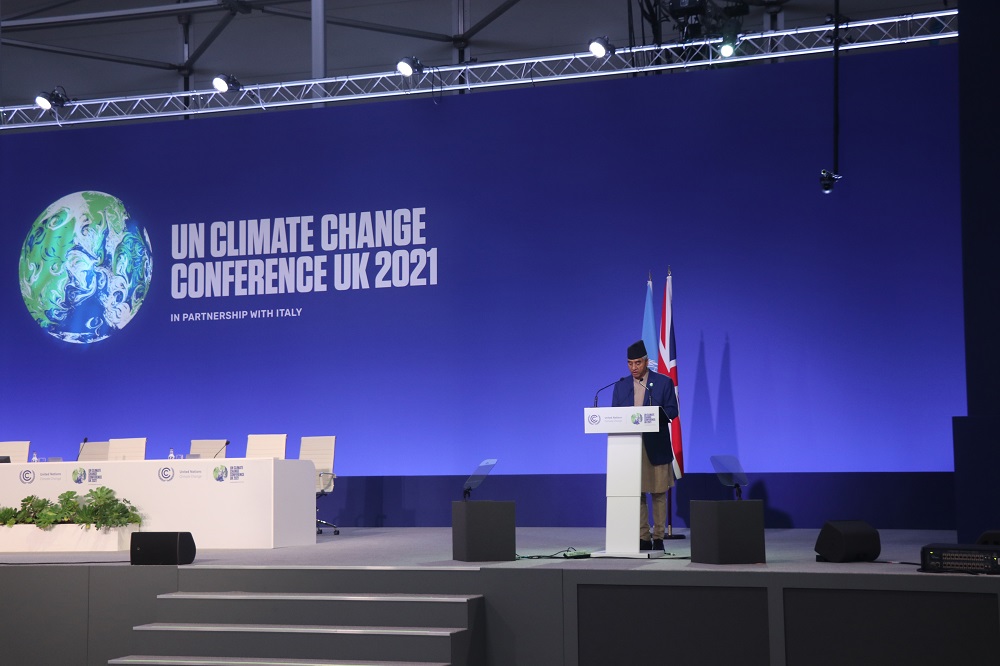The COP26 conference in Glasgow is progressing reasonably well, with countries making new climate commitments and taking improvised climate action to achieve carbon neutrality.
Most recently, India has committed to becoming carbon neutral by 2070. With this declaration, India becomes the world’s last major carbon polluter to establish a net-zero target, with the United States and the European Union aiming for 2050 and China aiming for 2060.
India’s Prime Minister, Narendra Modi, announced that the country’s installed capacity of “non-fossil energy” – largely solar – will be increased from 450 to 500 gig watts by 2030.
PM Modi also stated that by 2030, India’s carbon intensity, or the quantity of products produced per unit of energy, would be lowered by 45 percent. The previous target had been set at 35%.
Nepal, too, has established a new goal of net-zero carbon emissions. Sher Bahadur Deuba, Nepal’s Prime Minister, said, “We have submitted an ambitious NDC that seeks to decarbonize our economy in all sectors.”
Nepal could be one of the first countries to get funding in exchange for lowering emissions from deforestation and forest degradation in accordance with performance metrics. The government should make sure it capitalizes on such initiatives and work on green growth.
Nepal’s goal is to be carbon-free by 2045. Similarly, Nepal has committed to provide 15 percent of the country’s overall energy consumption from clean energy sources by 2030, as well as maintaining 45 percent of the country’s forest cover.
Despite being modest in contrast to other countries, Nepal’s per capita greenhouse gas emissions have doubled in the last ten years.
This is particularly incongruent with the country’s goal of achieving net-zero emissions by 2045, as well as the country’s growing trade deficit due to rising petroleum imports.
Looking at the mandatory report filed by the Ministry of Environment and Forest with the United Nations Framework Convention on Climate Change (UNFCCC), the 2014 report was for the base year 2000/01, and the 2021 report was based on GHG inventory for 2010/2011.
So, according to the study, Nepal’s GHG emissions doubled in ten years between 2001 and 2011, rising from 13,447 to 28,166 Gg CO2.
With this reality in mind and a more optimistic goal of net-zero carbon emissions by 2045, Nepal must now take climate action more seriously in order to avoid having to extend the target in the future.
Nepal had pledged to strengthen its public transportation network and turn 90 percent of its vehicles electric by 2030 in order to achieve carbon neutrality.
Eliminating fossil fuel consumption and replacing it with greener sources will lower greenhouse gas emissions by up to 28 percent. The remaining energy comes from construction, industry, and other purposes.
However, very little has been done to achieve all of this until 2021. Nepal has a long way to go, and achieving all of these by 2045 will be extremely tough given the current government’s attitude and approach to work.
Nonetheless, PM’s commitment to becoming Net-Zero by 2045, a bold step forward, has to be appreciated.
This implies that the government or authorities must strive towards resilient and sustainable development.
Protecting the environment, also known as “green growth,” has become an urgent global requirement backed by both governments and it is high time for the government to be visionary and implement green growth policies.
Some initiatives for green economic growth are included in the upcoming FY’s budget, such as switching to fully electric vehicles by 2088 B.S. (2031 A.D.), operating 100 electric buses in Kathmandu, encouraging top vehicle companies to assemble electric vehicles in Nepal, and exempting electric vehicles from taxes.
If someone wishes to change their present internal combustion engine vehicle to an electric vehicle, the budget has waived the renewal taxes for five years.
Another positive step is the budget’s restriction of plastic bags to fewer than 40 microns beginning next year. Initiatives like these are really crucial for Nepal to achieve its goals.
When it comes to the types of industries that produce steel, it should be highlighted that induction furnace industries are known as one of the most polluting. Promoting such industries demonstrates the government’s lack of commitment to climate change.
The government should assign the task of converting the transportation system to electric and building and administering charging infrastructure to the private sector in the coming days.
The government should combine available resources with stronger policies and promises to establish a “Green Growth Stimulus Package” by mobilizing external financing, primarily grants, to build new growth sectors.
It should be noted that the LEAF coalition, which was formed in April by the United States, the United Kingdom, and Norway, will reveal that it has raised $1 billion in public and private funds to help governments and states prevent deforestation.
Nepal could be one of the first countries to get funding in exchange for lowering emissions from deforestation and forest degradation in accordance with performance metrics. The government should make sure it capitalizes on such initiatives and work on green growth.
Similarly, the government must examine and enhance its domestic industry in order to cope with lower carbon emissions.
The newly formed government recently exempted all taxes, including excise charges, for industries that employ induction furnaces through its new budget, which was passed through a substitution bill.
When it comes to the types of industries that produce steel, it should be highlighted that induction furnace industries are known as one of the most polluting. Promoting such industries demonstrates the government’s lack of commitment to climate change.
Let’s hope that the government realizes this need and reacts with a robust green growth package and a practical sustainable environment assessment that demonstrates a greater commitment to the environment and ecosystem, either during the budget implementation stage or the next time around.
There is an opportunity for Nepal to move into a green economy and we think that it should not miss this opportunity.









Comment